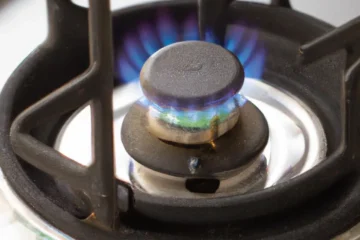It is a common misconception that electric stoves use gas when this is not the case. This misunderstanding can confuse, especially for those researching their cooking appliance options. If you’ve ever asked yourself, “Do electric stoves use gas?” you’re not alone! In this blog post, we will discuss the differences between electric and gas stoves and clarify the confusion about which type of stove uses what fuel.
How do Electric Stoves Work?
Electric stoves work by converting electrical energy into heat energy. They use heating elements, typically made of metal, that heat up when an electric current is passed through them. The heating elements are controlled by a thermostat or switch, which regulates the temperature. The heat is then transferred to pots and pans placed on the stovetop and to the oven through heating coils or elements. A separate thermostat or switch controls the oven temperature.
Do Electric Stoves Use Gas?
No, electric stoves do not use gas. They use electricity as their source of power. Electric stoves have heating elements, typically made of metal, that heat up when electricity is passed through them. These heating elements can be found in the burners on the cooktop, as well as in the oven. The heat generated by these heating elements is then transferred to the pot or pan placed on the cooktop or to the food inside the oven.
Electric stoves do not require a gas line or fuel storage and do not produce emissions or fumes. They are considered a cleaner and more efficient alternative to gas stoves.
Do Gas Stoves Use Electricity?
Gas stoves do not use electricity to operate. They use a gas fuel source, natural gas or propane, to heat the burners. However, some gas stoves may have electric ignition systems that use a small amount of electricity to light the burners. Also, some gas stoves may have electric components such as digital displays or timers.
Do Electric Stoves Use A Lot Of Electricity?
Electric stoves use a significant amount of electricity to convert electricity into heat for cooking. On average, an electric stove can use 1,000 to 3,000 watts per hour, depending on the size and settings of the stove. However, this can vary depending on factors such as the size of the stove and how often it is used. For example, a larger stove or one used frequently will likely use more electricity than a more miniature stove or one used less often.
Gas Vs Electric Stove Safety
Gas stoves can be dangerous if not correctly installed or maintained. Leaks can lead to fires or explosions, and incorrect installation can lead to carbon monoxide poisoning. It is essential to have a professional check for leaks and properly install the stove. It is also essential to properly turn off the gas supply when not in use and not use the stove if you smell gas.
Electric stoves are generally considered safer than gas stoves as they do not produce carbon monoxide, and there is no risk of gas leaks. However, they can still pose a fire risk if not used properly. It is essential to keep the stove and cooking area clean, use proper cookware, and not leave the stove unattended.
Safety precautions such as keeping the stove and cooking area clean, using proper cookware, and not leaving the stove unattended are essential, regardless of whether you have a gas or electric stove.
Gas Vs Electric Stove Efficiency
Gas stoves are generally more efficient than electric stoves because they heat up faster and can be more easily controlled. The heat from a gas stove is also more immediate, so you can start cooking immediately. Electric stoves take longer to heat up and must be more responsive to temperature changes. However, electric stoves are more energy efficient in the long run because they don’t lose heat through vents as gas stoves do.
What Benefits Does an Electric Stove Have Over a Gas Stove?
Electric stoves have several benefits over gas stoves. One benefit is that they are more energy efficient and can help to reduce energy costs. Electric stoves also tend to have more precise temperature controls, allowing for more accurate cooking. Also, they are safer to use, as there is no open flame and no risk of gas leaks. Electric stoves are also easier to clean, as they have smooth, flat surfaces, unlike gas stoves with many crevices that can be difficult to clean. Electric stoves also typically have a longer lifespan than gas stoves.
Do Ovens Use Gas Or Electricity?
Ovens can use either gas or electricity as a power source. Gas ovens use natural gas or propane as a fuel source, while electric ovens use electricity from the power grid. Some ovens can also be dual fuel, which means they can be operated using gas and electricity.
Do Electric Stoves Need 220?
Electric stoves can operate on either 120 or 220 volts. However, most stoves require 220 volts to function correctly, as it allows for a stronger current and, thus, more power. Suppose you need help determining whether your stove requires 220 or 120 volts. In that case, check the specifications listed in the manual or on the stove itself. Additionally, you should ensure that your home’s electrical system can provide the necessary voltage before purchasing or installing an electric stove.
Are Electric Stoves Cheaper Than Gas?
The cost of an electric and gas stove can vary depending on the specific model and brand. Electric stoves are more expensive to purchase than gas stoves.
However, the operating costs of electric stoves can be less than gas stoves, as electricity is often cheaper than natural gas. Also, electric stoves are more efficient than gas stoves and don’t require a flue or chimney. Ultimately, the cost difference between electric and gas stoves will depend on location and usage.
Are Electric Stoves Better Than Gas For The Environment?
Electric stoves are generally more environmentally friendly than gas stoves. Electric stoves do not produce emissions, whereas gas stoves release carbon monoxide and other pollutants into the air.
Furthermore, electricity can be generated from various renewable sources, such as wind and solar. In contrast, natural gas is a fossil fuel contributes to greenhouse gas emissions. However, the environmental impact of an electric stove will depend on how the electricity used to power it is generated. Suppose the electricity is generated from fossil fuels. In that case, the electric stove will not be as environmentally friendly as one powered by renewable energy.
Do Electric Stoves Run On 110?
Electric stoves can run on various voltages, including 110 and 220. The voltage required for an electric stove depends on the specific model and the electrical wiring and circuit in the building where it will be used. It is essential to check the specifications of the stove to determine the voltage required and ensure that the electrical wiring in the building is compatible.
Can You Use An Electric Stove In A Gas House?
Yes, it is possible to use an electric stove in a gas house. Still, it would require additional electrical work in the kitchen. An electric stove needs a dedicated electrical circuit and outlet, which may not be in a house set up for gas appliances.
A gas line must be capped off to ensure no gas leak. Hiring a licensed electrician and a licensed gas fitter is recommended to handle the installation.
Does An Electric Oven Use Gas?
An electric oven does not use gas as it operates solely on electricity. Electric ovens use heating elements typically located in the bottom and top of the oven to heat up the oven to the desired temperature. These heating elements convert the electrical energy into heat energy, which is then used for cooking food.
How To Use Gas Range With Electric Oven?
A gas range with an electric oven is standard in many kitchens. To use it, first make sure that the range and oven are correctly connected to a gas supply and an electrical outlet, respectively. Then, turn on the gas supply to the range and light the burners using a match or a spark igniter.
To use the oven:
- Set the desired temperature using the oven control knobs or digital display, and place your food in the oven.
- Use the oven or your timer to keep track of cooking time.
- Always watch your food while cooking, and use oven mitts or pot holders to handle hot dishes and pans.
Why Does A Gas Stove Need Electricity?
A gas stove needs electricity to power the electronic ignition system, which is used to light the burners. Without electricity, the burners would need to be lit manually with a match or lighter. Some gas stoves may also have electronic controls, such as a digital display or a timer, requiring electricity.
Overall Thoughts
We hope you enjoyed our blog post on electric stoves. An electric stove may seem like a very confusing appliance, but it is actually straightforward. We hope this article helped you to learn more about electric stoves and what they can do. Please let us know if you have other questions about the electric stoves.




